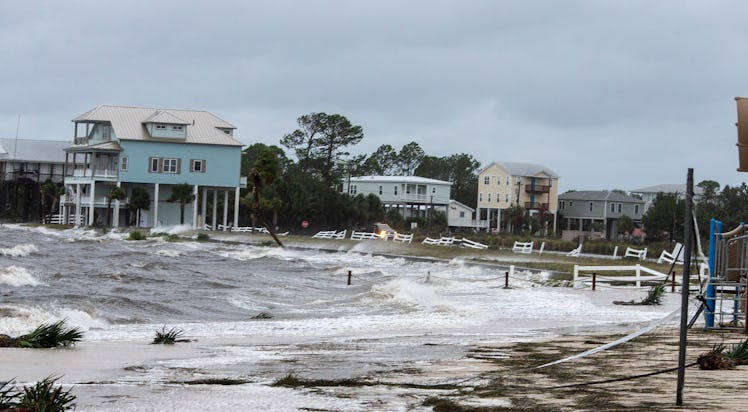
Here's How To Do Your Part & Help Victims Of Hurricane Michael
On Wednesday, Oct. 10, Hurricane Michael touched down in Florida. The Category 4 storm brought with it heavy winds, downpour, flooding, and lots of damage. While Florida deals with the aftermath of a storm like they've never seen before, here's how to help Hurricane Michael victims. Let's make clean-up a joint effort.
Hurricane Michael crash landed on the Florida Panhandle on Wednesday afternoon with 155 mph winds. The storm caused significant damage to land and property, leaving once beautiful beach towns in complete ruin and many of those on the ground with no power, and even homeless. As of the afternoon of Thursday, Oct. 11, four people have been reported dead due to the storm, according to The New York Times, and hundreds of people are being evacuated from damaged hospitals in the area. More than 1 million homes are without power. And while no one alone can clean everything up and restore the Florida Panhandle, there are a few ways you can help out.
The easiest thing you can do is donate money. Many people think want to donate supplies after a hurricane hits, but The Weather Channel points out that sending supplies to hurricane-torn places often creates a lot of extra work and expense, as those supplies have to be sorted and transported, and they're not always what's most needed on the ground. Instead, just give money so it can be spent where needed. If you're able to spare some cash, then there are a few places you can donate, including the American Red Cross, Habitat for Humanity (which is dedicated to rebuilding communities destroyed by disaster), and the National Voluntary Organizations Active in Disaster (National VOAD) are all accepting donations. Charity Navigator has a full list of vetted charities aimed at supporting the victims of Hurricane Michael, so you can check those out too and pick which you want to give to.
If you can't donate cash but you're in the Florida area (or can be) then you have a few more options. One of the things CNN says is most important post-storm is blood donation, and community centers in the area are urging the public to give. OneBlood, a not-for-profit blood center, is looking for blood donations, and you can either find a facility on this list or call 1-888-936-6283. They don't just have locations in Florida: you can also find them in Alabama, Georgia and South Carolina, or you make an appointment online with the American Red Cross to donate blood.
Another option available to those close to Florida is to actually go and volunteer. In order to do so, head to volunteerflorida.org and click "volunteer." From there you'll be asked to fill out some basic information like your name and address, and to check off any skills or experience you might have in things like medical or health care fields, customer service, debris removal, or shelter operations. You'll also be asked to check off which areas you're interested in. You can pick from things like administrative work, human services, and call centers. The list pretty much covers all the areas you'd figure might be useful in hurricane relief efforts. After your application is reviewed, they'll let you know if you're good to volunteer and where to report.
Hurricane Michael was a very heavy storm that left a lot of damage, but there are so many ways you can be involved and help out the victims of the storm. So whether you can be on the ground volunteering or you're miles and miles (and miles) away, there's always something you can do to help out.